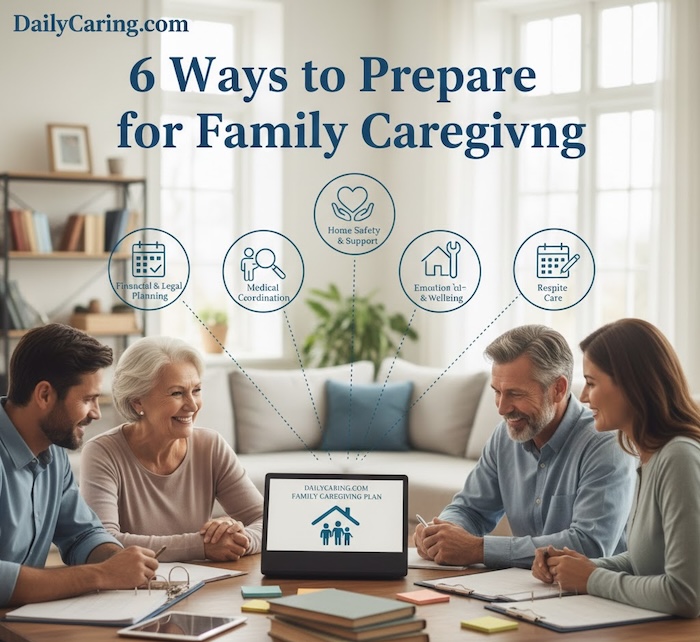Discussing aging challenges with your parents can feel overwhelming. No one wants to upset their loved ones or spark resistance. Yet open and compassionate conversations are essential to ensuring their safety, health, and happiness as they age. Approaching topics such as driving, home safety, and long-term care with patience and a clear strategy can make all the difference.
In this article, we share five practical tips for talking with your parents about aging. These tips will help you navigate these issues with empathy, respect, and clarity. Planning ahead of a crisis is one of the greatest gifts you can give your family.

Talking to Aging Parents About the Challenges Ahead
You might have noticed that your parents are starting to need more help.
Maybe the house is filthy, they’re not eating correctly, or medication doses are being missed.
Talking with parents about aging and lifestyle changes can be challenging, but everyone should have these conversations before a crisis.
Remembering what you’re discussing will likely mean significant life changes, so it will take more than one conversation before things happen.
Your parents will need time to get used to the idea and accept that they need more help.
And because these are sensitive topics, planning will make the conversations easier and more productive for everyone.
We’ve got five valuable tips to help you plan your responses, introduce the topic, and make the conversations as successful as possible.
How to Talk with Parents About Aging: 5 Tips
1. General Guidelines: Get Organized
- Write an outline to organize your thoughts. This will also give you something to follow so you won’t forget important points.
- Approach the conversation by focusing on the most important considerations for older adults: safety, freedom, peace of mind, social connection, and the ability to make choices.
- Emphasize that there aren’t “right” or “wrong” options or ideas. It’s helpful to keep an open mind and consider various options.
2. Be Respectful and Considerate
- Put yourself in their shoes. Let them know you care about how they feel and what they want.
- Be a good listener. Let them talk and really listen, even if you disagree with what they say. It will make you think about your own aging.
- Your relationship may change as you have these conversations and take a more active role in their life, but you shouldn’t consider yourself the “parent” or that you now “know what’s best.”
3. Who will be there, and where will this happen?
- Involve everyone in the family who should be there.
- Plan for plenty of time to talk in a quiet place where your parents can feel calm and focus on the conversation.
4. Do a practice run
- If you’re nervous about the conversation, run your ideas past an impartial person—a social worker at a local agency or senior center, a counselor or therapist, or a leader at your church.
5. Use conversation starters to ease into the subject
- Start with some casual conversations about planting seeds. Then build on those to lead to bigger, more decision-focused discussions later.
- Consider using these icebreakers:
- Say, “I’ve noticed some things take more energy these days. What are the important things you want to do?” Or “What are your priorities? Is there a way we can make it easier for you to do those things?”
- Mention how much you admire how they’ve handled retirement and ask for advice on what has worked well for them so that you can learn from them.
- Use an event in the news or a story about an aging family member or friend. Say, “We never talk about these things. I don’t want to pry, but knowing there’s a plan if we need it would give me peace of mind.”
Recommended for you:
- 7 Steps to Take When Aging Parents Need Help
- What To Do When Aging Parents Refuse Help They Need
- Dealing with Aging Parents and Siblings: 5 Ways to Work Better Together
About the Author

Connie is the founder of DailyCaring.com and was a hands-on caregiver for her grandmother for 20 years. (Grandma made it to 101 years old!) She knows how challenging, overwhelming, and all-consuming caring for an older adult can be. She also understands the importance of support, especially in the form of practical solutions, valuable resources, and self-care tips.














I truly appreciate the thoughtful content on your site—it’s been incredibly helpful.
We’re facing a heartbreaking challenge with my 79-year-old father. He’s always been fiercely independent, and driving has long been a symbol of that independence for him. However, over the past few months, we’ve noticed increasing confusion, forgetfulness, and even a few close calls on the road. His doctor hasn’t officially restricted him from driving, but we know deep down it’s no longer safe.
We recently made the difficult decision to disable his vehicle, and now he feels betrayed, even angry. It’s tearing us apart emotionally.
How do we explain to him, gently and lovingly, that this isn’t about control—it’s about protection, dignity, and care? We want him to feel heard, not punished. Any guidance or shared experiences would be deeply appreciated.
Hi Jason, I’m encouraging our readers to chime in here as so many of us have experienced some of the same things you’re experiencing.
First off, this is a real tough one. When you “take away the keys” some (most) may see it as taking away one’s independence. When I faced this issue with my dad, I was focused on his safety, and the safety of others.
Here’s a few articles we published to help get the conversation started:
When should seniors stop driving?
8 Ways to Stop an Elderly Person From Driving When All Else Fails
4 Tips to Get an Elderly Person to Stop Driving
Your web has Great tips and information.
Our family feels our 81 year old mom shouldn’t be driving any longer due to early signs of dementia but her physician hasn’t taken her license away. We have taken her car keys away from her and she is angry about this. How do we get her to understand?
I’m so glad our articles are helpful! It’s great that you’re keeping your mom safe by not allowing her to drive. Her anger is a natural response, especially because she has dementia and the damage in her brain will make it more difficult for her to think logically. We’ve got a couple of articles with suggestions that may help:
— https://dailycaring.com/4-tips-to-get-an-elderly-person-to-stop-driving/
— https://dailycaring.com/8-ways-to-stop-an-elderly-person-from-driving-when-all-else-fails/